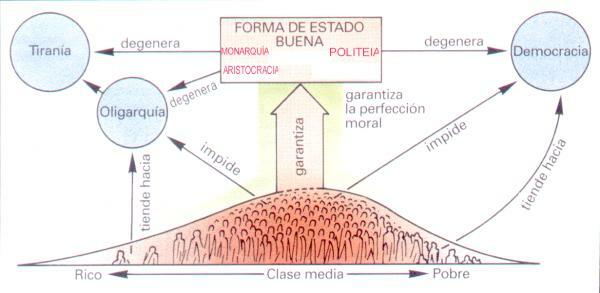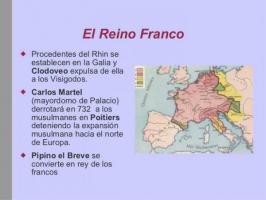Aristotle's POLITICAL theory

In this lesson from a TEACHER we explain the Aristotle's political theory which, unlike Plato, does not constitute the basis of his philosophy, but is just one more element of his thought. This is because the Stagirite had no political rights in Athens, since he was a Metec, a foreigner. Anyway, some aspects of his thinking derive in part from his teacher's thinking.
On his "Politics", Aristotle, defines the human being as a zoon politikón, that is, a political animal, makes an exposition of the different forms of government depending on the number of rulers and the their objective, the role of women in society, the education of boys and girls, the economy and war fair. If you want to know more about Aristotle's political theory, keep reading this lesson from a PROFESSOR.
Index
- Definition of human being in Aristotle: Zoon Politikón
- Different forms of government according to Aristotle
- Politeia as the best form of government
- The role of women in the city
Definition of human being in Aristotle: Zoon Politikón.
The Aristotle politics is a derivation of his ethicsof him, which is based on the idea that the goal of the human being is happiness and this is only possible within the city.
A fundamental aspect of Aristotle's political theory is his consideration of the human being as a political animal, or zoon politikón. For Estagira's, the human being is a social being by nature, incapable of surviving apart from the group, although his objectives within it may be different.
In addition, the human being, unlike the rest of the animals, has the ability to speak and therefore to share moral concepts, such as the Justice.
Society, as well as laws are "natural", According to Aristotle and human beings unite, first to procreate and later, they form communities where there are "natural masters", which are those who have the capacity for government and "natural slaves", that is, hand working. Finally, from the union of several villages, the city-states arise.
“From all this it is evident that the city is one of natural things, and that man is by nature a social animal, and that the insocial by nature and not by chance is either an inferior being or a superior being man"
Different forms of government according to Aristotle.
Aristotle determines a political system based on two variabless: the number of rulers and the objective of each one, that is, if they pursue the public good or the private good. Because the objective of the State is to impart justice and maintain the economic stability of the city, but Above all, he must promote the good life on the part of individuals, with capacities to perform extraordinary.
"Political association should therefore be seen as for the sake of noble deeds, not for the sake of living together." Aristotle. Politics.
Thus, according to the number of rulers and their objective, Aristotle will define his system of government:
- Monarchy: it is the government of a single person, the most virtuous and noble of the city, but it is corrupted, degenerating into tyranny, the government of a single person but that only seeks his own benefit.
- Aristocracy: it is the government of a few, the most virtuous, but they are corrupted due to their desire for ambition and degenerates into an oligarchy, or the government of the richest.
- Democracy: It is the majority government, but economic instability and social crises make it degenerate into demagoguery, which tries to manipulate citizens.
“[...] we all agree that the most excellent man must rule, that is, the supreme by nature, and that the law governs and has only authority; but the law is a type of intelligence, that is, a speech based on intelligence. [...] And since everyone chooses above all what conforms to his own appropriate dispositions [...], it is clear that the intelligent man will choose above all to be intelligent; because this is the function of that ability. Therefore, it is evident that, according to the most authoritative judgment, intelligence is supreme among goods. " Aristotle. Protreptic, VI.

Image: Slideshare
The politeia as the best form of government.
Aristotle defends a form of government that is a combination of democracy and aristocracy and what's called Politeia, and by means of which, the lands are distributed among the citizens and it would be the slaves who would cultivate it.
The Greek thinker bet on a middle class society, that encourages the leisure of its citizens allowing them to dedicate themselves to their professions: judges, merchants and priests. In this way riots would be avoided.
“It is evident that the medium-type regime is the best, since it is the only one free of seditions. It is where the middle class is numerous that the least seditions and discords take place among citizens. And the big cities are freer of seditions for the same reason, because the middle class is numerous; on the other hand, in the small ones it is easier for all citizens to divide into two classes, so that there is nothing left in the middle of them, and almost all of them are either poor or rich. " Aristotle. Politics.

The role of women in the city.
His conception of women had a great impact on other thinkers, especially during the Middle Ages, when consider that they should submit to menHowever, they were superior to slaves.
“The slave is absolutely deprived of will; the woman has it, but subordinate; the child only has it incomplete ”. Aristotle. Politics.
Women, Aristotle affirms, are inferior to men, who are active at the time of procreation, while they are passive.
“The male is by nature superior and the female inferior; one governs and the other is governed; this principle of necessity extends to all humanity. Aristotle. Politics.
Despite his consideration, for Aristotle, women's happiness was as important as men's. Because if the ruler forgets women, he is being unfair to half the population and therefore it was a city without laws.
If you want to read more articles similar to Aristotle's political theory, we recommend that you enter our category of Philosophy.

